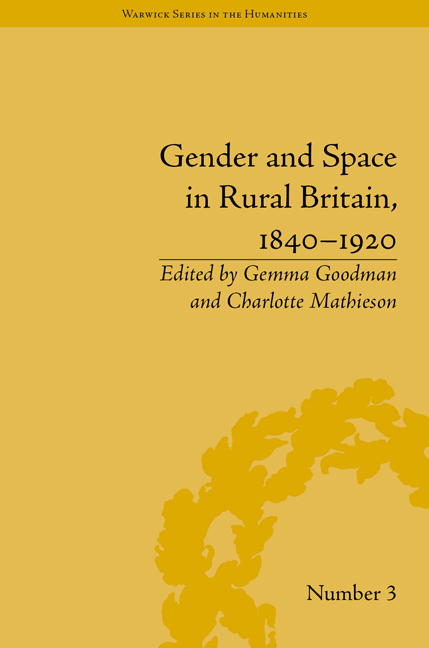Book contents
- Frontmatter
- Contents
- Acknowledgements
- List of Contributors
- Introduction: Gender and Space in Rural Britain, 1840–1920
- 1 Women in the Field
- 2 ‘Between Two Civilizations’: George Sturt's Constructions of Loss and Change in Village Life
- 3 At Work and at Play: Charles Lee's Cynthia in the West
- 4 ‘Going Out, Going Alone’: Modern Subjectivities in Rural Scotland, 1900–21
- 5 ‘Drowned Lands’: Charles Kingsley's Hereward the Wake and the Masculation of the English Fens
- 6 ‘Wandering Like a Wild Thing’: Rurality, Women and Walking in George Eliot's Adam Bede and The Mill on the Floss
- 7 ‘I Never Liked Long Walks’: Gender, Nature and Jane Eyre's Rural Wandering
- 8 Gertrude Jekyll: Cultivating the Gendered Space of the Victorian Garden for Professional Success
- 9 From England to Eden: Gardens, Gender and Knowledge in Virginia Woolf's The Voyage Out
- 10 The Transnational Rural in Alicia Little's My Diary in a Chinese Farm
- Notes
- Index
4 - ‘Going Out, Going Alone’: Modern Subjectivities in Rural Scotland, 1900–21
- Frontmatter
- Contents
- Acknowledgements
- List of Contributors
- Introduction: Gender and Space in Rural Britain, 1840–1920
- 1 Women in the Field
- 2 ‘Between Two Civilizations’: George Sturt's Constructions of Loss and Change in Village Life
- 3 At Work and at Play: Charles Lee's Cynthia in the West
- 4 ‘Going Out, Going Alone’: Modern Subjectivities in Rural Scotland, 1900–21
- 5 ‘Drowned Lands’: Charles Kingsley's Hereward the Wake and the Masculation of the English Fens
- 6 ‘Wandering Like a Wild Thing’: Rurality, Women and Walking in George Eliot's Adam Bede and The Mill on the Floss
- 7 ‘I Never Liked Long Walks’: Gender, Nature and Jane Eyre's Rural Wandering
- 8 Gertrude Jekyll: Cultivating the Gendered Space of the Victorian Garden for Professional Success
- 9 From England to Eden: Gardens, Gender and Knowledge in Virginia Woolf's The Voyage Out
- 10 The Transnational Rural in Alicia Little's My Diary in a Chinese Farm
- Notes
- Index
Summary
The Findlater sisters, Mary and Jane, published much of their poetry and fiction at a specific interlude in the advance of modernity in Scotland, between 1895 and 1921. As attention to their co-authored novel Crossriggs (1908) and to short stories by Jane authored in the aftermath of the First World War will show, their ambivalent responses to the changing times informs writing which, although conventional in form and traditional in its focus on rural and domestic settings, expresses the challenges and opportunities afforded by new forms of subjectivity available for women in the early years of the twentieth century. Recent scholarship on the Findlater sisters has drawn attention to this ambivalence: Sandra Kemp, Charlotte Mitchell and David Trotter describe Crossriggs as both a ‘lightly told vignette of Scottish village life’ and a ‘despairing exploration’ of one woman's ‘lonely situation’, while Douglas Gifford has explored how in various ways, the Findlaters were aesthetically, politically and emotionally ‘Caught Between Worlds’ (the title of his essay on the sisters). In this chapter, I will contribute to current (and by no means extensive) scholarship on the Findlaters by suggesting how significant their characters' responses to rural space are in their explorations of some of the most pressing emotional and material frustrations of rural women's lives in early twentieth-century Scotland.
- Type
- Chapter
- Information
- Gender and Space in Rural Britain, 1840–1920 , pp. 55 - 72Publisher: Pickering & ChattoFirst published in: 2014



